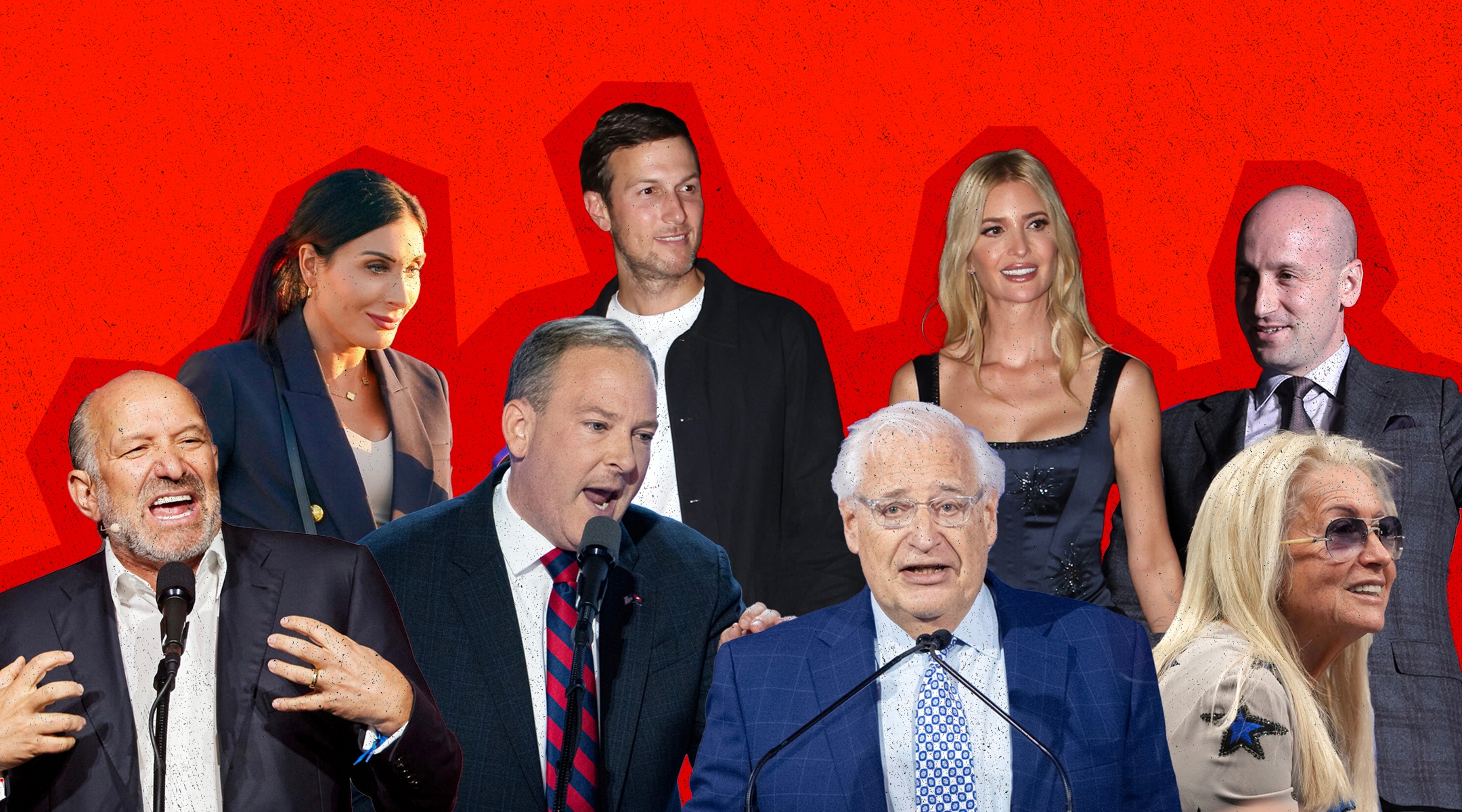Stephen Miller. David Friedman. Jared. Ivanka.
These names, and a few others, became familiar to American Jews over the four years of the first Donald Trump White House. Depending on the day, and their political views, Jews looked on them with pride or scorn, hope or disappointment. In addition to shaping the course of the first Trump administration, they became symbols of and conduits for the president’s relationship with the Jewish community.
Now, four years later, as Trump prepares to reenter the White House, some of that cast of characters is back while others have dropped off the stage. Other Jewish figures are making their entrances for the first time. Some come from Trump’s time in the worlds of media and business, others from his decade in politics, still others from his family.
Here are the Jews to know in Donald Trump’s inner circle.
Jared Kushner and Ivanka Trump

Jared Kushner and Ivanka Trump in Miami Beach, Florida, May 2, 2024. (MEGA/GC Images)
No two Jews drew more attention than Trump’s daughter and son-in-law, Ivanka Trump and Jared Kushner. Coming to the White House from the social circles of wealthy New York City millennial life, the couple were seen as a relatively liberal, moderating influence on a president who had never before held office.
They both served as White House advisers and took central roles in the administration. Kushner, in particular, had a wide-ranging portfolio spanning everything from negotiating a new trade deal with Mexico and Canada to running Trump’s 2020 reelection campaign to brokering the normalization agreements between Israel and several Arab states known as the Abraham Accords.
They were also in some ways the Jewish face of the administration, making appearances at Jewish sites and hosting members of the cabinet for Shabbat dinner. Particularly at the beginning of Trump’s term, their Jewish observance — they have attended Orthodox synagogues and send their kids to Jewish day school — drew curiosity and scrutiny.
After Trump’s 2020 loss, the family moved to Miami and sat out Trump’s most recent reelection campaign. Ivanka, who campaigned with her father during his previous two electoral campaigns, said after Trump’s campaign announcement in 2022 that she and Kushner would step back to focus on family life. Kushner said he would focus on his business and the couple’s children.
Kushner suggested to The New York Times late last month that the pair would remain outside of politics if Trump won the election, though more recent reports suggest he may be involved in some way with Trump’s Middle East policy. During the campaign, the couple appeared at several events, including the Republican National Convention and Trump’s victory party.
They’re not entirely separated from their work in the first Trump administration. Kushner runs a multi-billion dollar investment firm tied to Arab states in the Gulf, raising ethics concerns about overlap with government affairs. The Democrat-led Senate Finance Committee opened an investigation into Kushner’s firm in June, though its future is uncertain.
Stephen Miller
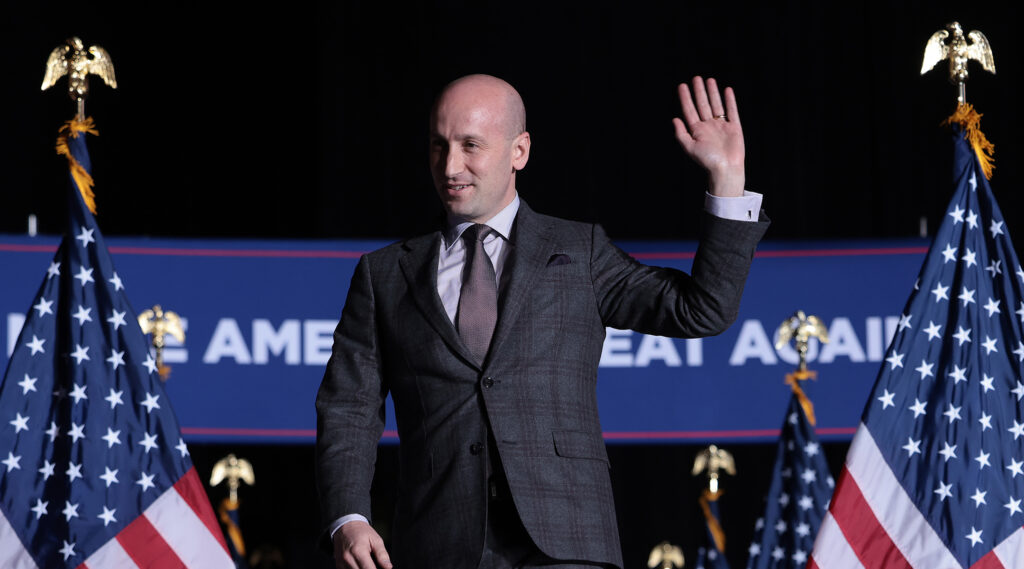
Stephen Miller speaks at a campaign rally for Donald Trump in Detroit, Michigan, Oct. 18, 2024. (Win McNamee/Getty Images)
Stephen Miller — one of Trump’s most hardline advisers on immigration during his first term, and one of that White House’s most polarizing figures — will serve as Trump’s deputy chief of staff in his next term.
During Trump’s first term, Miller was an architect of some of the administration’s most divisive actions on immigration, including the family separation policy and the travel ban on a number of Muslim-majority countries. A broad range of Jewish officials and groups criticized those policies and called for Miller’s resignation.
Over the last four years since Trump was voted out, Miller launched a firm called America First Legal that bills itself as a conservative response to the ACLU, and was involved in Project 2025, the controversial compilation of proposals for a second Trump term. He and his wife, who wed in 2020, have also had three children.
This year, Miller campaigned for Trump, and used nativist rhetoric at Trump’s controversial rally in Madison Square Garden last month.
“America is for Americans and Americans only,” Miller said, adding that U.S. citizens were having their jobs “looted and stolen.”
In an interview last week with Fox News, Miller said Trump would begin deporting undocumented immigrants immediately after taking office. In multiple interviews, he has outlined plans to deport millions of migrants, renewing Jewish groups’ concerns.
“The invasion will end the instant that he takes the oath of office,” Miller said.
David Friedman
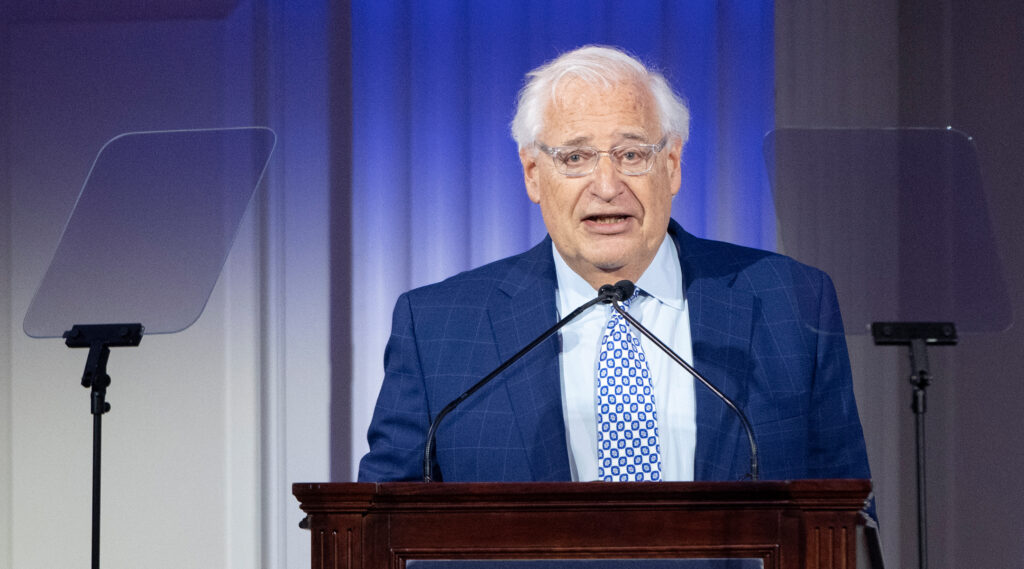
David Friedman speaks during The Jerusalem Post New York conference, June 3, 2024. (Noam Galai/Getty Images)
David Friedman, who worked as Trump’s bankruptcy lawyer before 2016, was ambassador to Israel during his first administration.
Friedman did not have foreign policy experience before becoming ambassador in 2017, and had been a supporter of Israeli West Bank settlements before entering office. As ambassador, he was a key part of the team that fulfilled a long wish list of Israeli government priorities — from moving the U.S. embassy to Jerusalem to brokering the Abraham Accords.
Friedman criticized his former boss for his 2022 meeting with Kanye West and Nick Fuentes, then two of the most prominent people spouting antisemitic rhetoric. “To my friend Donald Trump, you are better than this,” Friedman tweeted after that meeting.
But he says he subsequently spoke with Trump and endorsed the former president’s reelection campaign, citing Trump’s “historic achievements” as president, and his support for Israel.
Friedman has pushed for Israeli annexation of the West Bank. He recently released a book arguing for Israeli control over the entire territory.
Friedman will not be reprising his role in Trump’s second term; Trump announced on Tuesday that former Gov. Mike Huckabee will be the next U.S. ambassador to Israel. Friedman said he was “thrilled” by Huckabee’s appointment.
Steve Witkoff
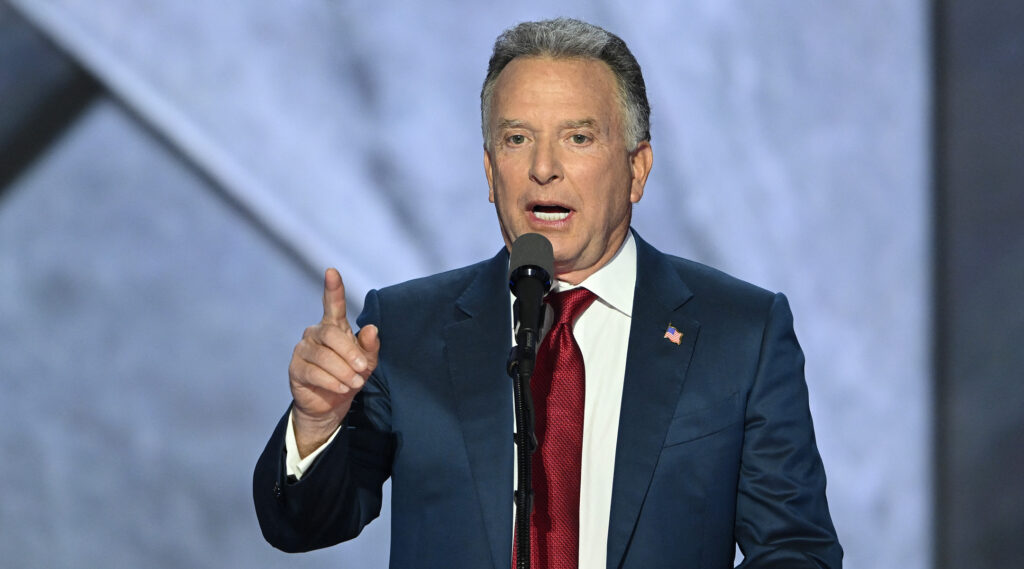
Steve Witkoff speaks during the Republican National Convention in Milwaukee, Wisconsin, July 18, 2024. (Andrew Caballero-Reynolds/AFP via Getty Images)
Steve Witkoff, a real estate businessman and Trump’s golf buddy, will be the Middle East envoy in the president-elect’s coming term.
In that role, Witkoff, 67, will take the spot occupied by Jason Greenblatt in the first part of Trump’s first term. In that role, Greenblatt conducted negotiations with leaders across the region. As was the case when Greenblatt entered the administration, Witkoff has no Middle East diplomatic experience.
Witkoff has been friends with Trump since the 1980s, when he bought Trump a sandwich after they worked on a real estate transaction. Witkoff has also praised Trump for his friendship after one of Witkoff’s sons, Andrew, died at a rehab facility.
Trump said Witkoff was playing golf with him when Secret Service agents fired at someone who was allegedly preparing to kill Trump. He and his son Zach spoke at the Republican convention in July.
Miriam Adelson
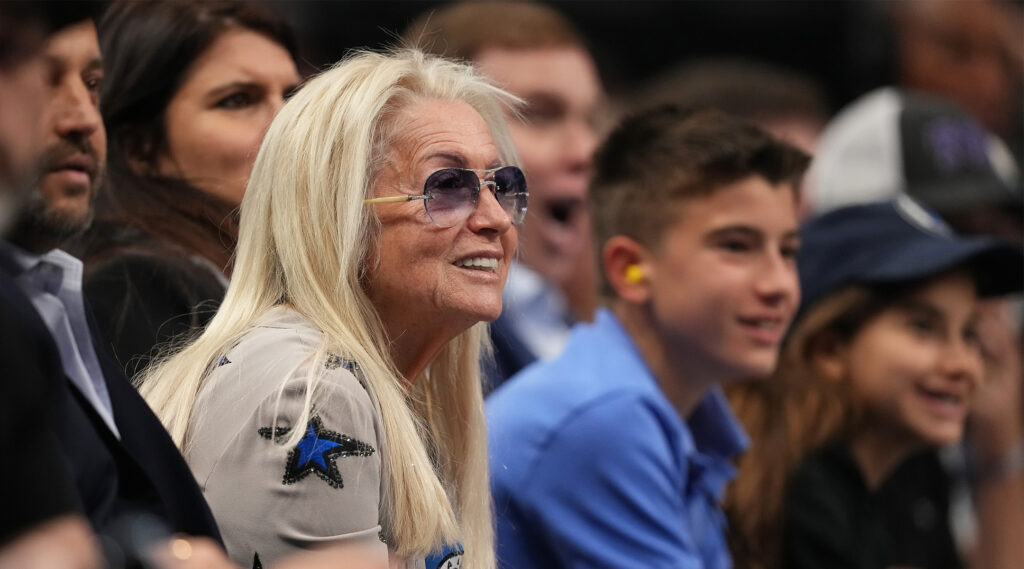
Miriam Adelson, majority owner of the Dallas Mavericks, watches a game at American Airlines Center, Dallas, Texas, Oct. 24, 2024. (Same Hodde/Getty Images)
Miriam Adelson, a prolific donor to Republican, pro-Israel and Jewish causes, is carrying on the legacy she built with her late husband, casino magnate Sheldon Adelson.
Adelson has remained a force in Republican politics, and has stayed close to Trump, since her husband’s death in 2021. She donated $100 million to a campaign committee supporting Trump’s candidacy. (Her estimated net worth is $35 billion.) During the campaign, she introduced Trump before he gave a speech on fighting antisemitism.
Adelson was born in Tel Aviv and reportedly spends much of her time in Israel. She is the publisher of the country’s largest print newspaper, Israel Hayom, which her husband founded.
Boris Epshteyn
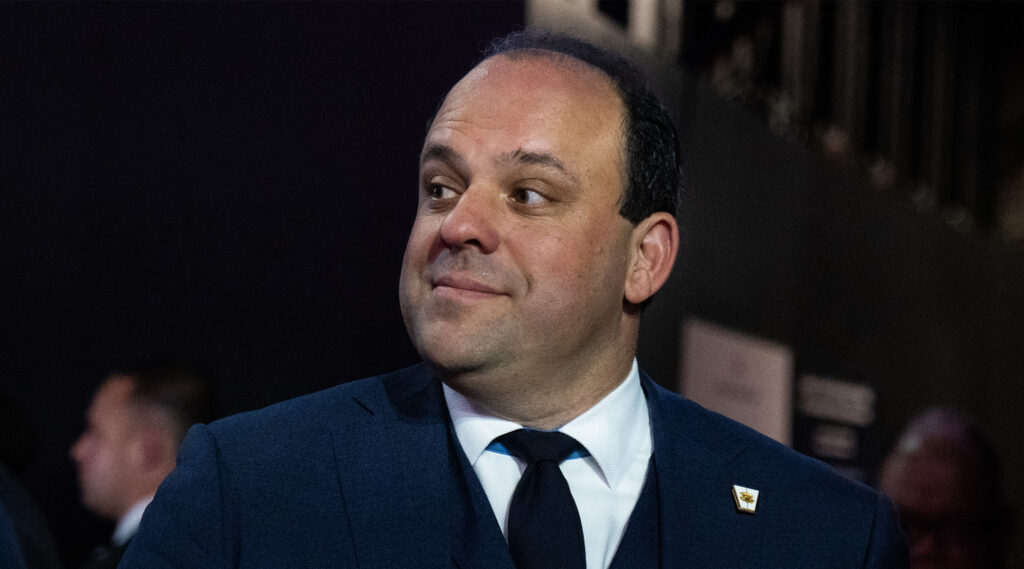
Boris Epshteyn arrives at the Republican National Convention, Milwaukee, Wisconsin, Jul. 16, 2024. (Tom Williams/CQ-Roll Call, Inc via Getty Images)
Boris Epshteyn is a longtime aide to Trump and political strategist. He often spoke for Trump on television during the 2016 campaign and advised his 2024 campaign.
Epshteyn served as a special assistant in the Trump administration during Trump’s first term and reportedly wrote a controversial statement for Holocaust Remembrance Day in 2017 that did not mention Jews.
Epshteyn, an investment banker and finance attorney, also collaborated with Rudy Giuliani on trying unsuccessfully to overturn the results of the 2020 election, and appeared with Trump in court in New York last year. Epshteyn was charged with felonies for election tampering in Arizona earlier this year and pleaded not guilty.
Epshteyn moved to the United States from his native Moscow in 1993 at the age of 11. He was previously a communications aide for Sen. John McCain’s 2008 campaign for president.
This week, Epshteyn was on Trump’s airplane with the president-elect, Elon Musk and Florida Rep. Matt Gaetz when Trump decided to nominate Gaetz, a Florida Republican who once invited a Holocaust denier to the State of the Union, as his attorney general. He has reportedly sparred with Musk over decisions during the presidential transition, and The New York Times reported that he has floated himself as Trump’s special envoy for the war in Ukraine.
Howard Lutnick
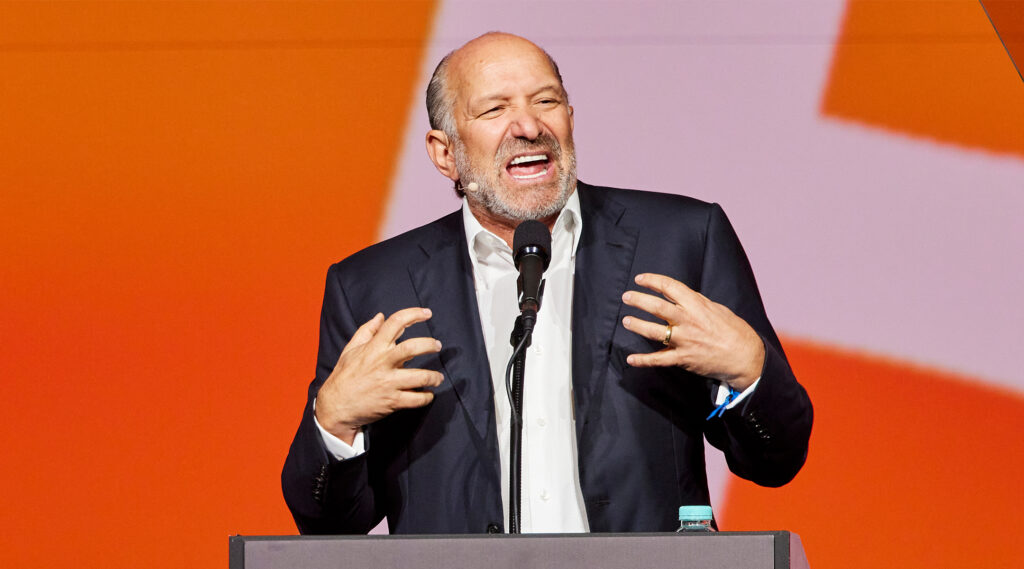
Howard Lutnick speaks at the 2024 Bitcoin Conference, Nashville, Tennessee, Jul. 27, 2024. (Johnnie Izquierdo/The Washington Post via Getty Images)
Howard Lutnick, the billionaire head of finance firm Cantor Fitzgerald, is the co-chair of Trump’s transition team.
He raised campaign funds for Trump and has taken on a prominent role on the president-elect’s team in recent months, speaking for Trump in the media, and earning plaudits from Trump family members and the campaign.
He has been in touch with Kushner about hiring and Musk about budget policy, The Wall Street Journal reported. The Washington Post has reported that Lutnick is a candidate for treasury secretary, though more recently, The New York Times reported that Lutnick “has gotten on Mr. Trump’s nerves lately.”
Lutnick is a supporter of pro-Israel causes including the first responder group United Hatzalah and Birthright, which organizes free 10-day trips to the country.
A New York native, Lutnick accompanied Trump to the grave of the late spiritual leader of the Chabad-Lubavitch Hasidic movement, Rabbi Menachem Mendel Schneerson, last month.
Elizabeth Pipko

Elizabeth Pipko at an Independence Day celebration, Jul. 4, 2021. (Wikimedia Commons)
Elizabeth Pipko, the GOP national spokesperson from New York, is one of Trump’s leading Jewish surrogates.
Pipko is a former model and often advocates for Jewish and pro-Israel causes. She was born to a family of immigrants from the former Soviet Union who settled in New York. Pipko grew up in New York City, where she attended the Orthodox Park East Day School in Manhattan. A rabbi from Park East Synagogue officiated her 2019 wedding, which took place at Mar-a-Lago, Trump’s Florida resort.
Pipko was a staffer for Trump’s 2016 campaign. She said later that she had kept the position secret because she feared it would hurt her modeling career due to animosity toward Trump in the modeling world.
In 2019, Pipko was a spokesperson for a group called Jexodus that encouraged young Jews to leave the Democratic Party. Over the last year, she has spoken frequently about antisemitism on college campuses.
Pipko told Israel’s Channel 12 news on Wednesday that Trump wants Israel’s war in Gaza to end “as soon as possible” with a “decisive victory.”
Lee Zeldin
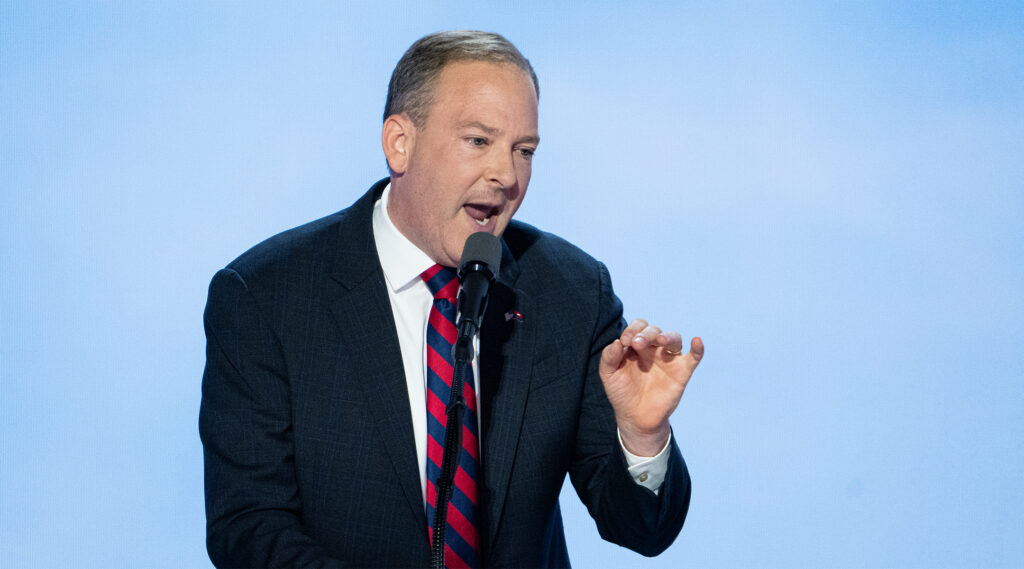
Lee Zeldin speaks at the Republican National Convention, Jul. 17, 2024. (Bill Clark/CQ-Roll Call, Inc via Getty Images)
As a congressman representing a Long Island, New York, district from 2015 to 2023, and as one of two Jews in Congress at the time, Lee Zeldin was an avid defender of Trump.
Zeldin kept a distance from Trump, who was then unpopular in New York, during his 2022 gubernatorial campaign. During that campaign, Zeldin leaned into his Jewish background to rally Orthodox communities, telling voters in Brooklyn about how his grandfather founded a synagogue and how his mother taught at a Brooklyn yeshiva.
But after he lost, he joined the board of the Republican Jewish Coalition and maintained ties with Trump and his reelection campaign. He was an early endorser of Trump’s bid to retake the White House.
This week, Trump rewarded Zeldin by choosing him to helm the Environmental Protection Agency. While in Congress, Zeldin mainly voted against environmental protection legislation.
Laura Loomer

Laura Loomer arrives at Philadelphia International Airport on The Trump Organization’s plane ahead of the presidential debate, Sept. 10, 2024. (Julia Beverly/Getty Images)
Laura Loomer, a Jewish far-right firebrand who once was the Republican nominee for a Florida congressional seat, has long come close to Trump but never worked for him.
Trump endorsed her 2020 run for Congress and nearly hired her as a campaign aide a year ago but was dissuaded by his aides from doing so. They were concerned about her record of racist and bigoted comments about Muslims and others.
Over the course of the campaign, Loomer began spending more time with Trump and traveled on his plane to Philadelphia to join him for the September presidential debate. Her presence and her racist comments about Kamala Harris drew criticism from Democrats and Republicans alike, including Rep. Marjorie Taylor Greene, who has herself been accused of hate speech (against Jews).
Loomer more recently drew criticism from within the party for criticizing Robert F. Kennedy, Jr., whom Trump has nominated as health secretary. She has not been rumored to be under consideration for any roles in the Trump administration.
Sid Rosenberg
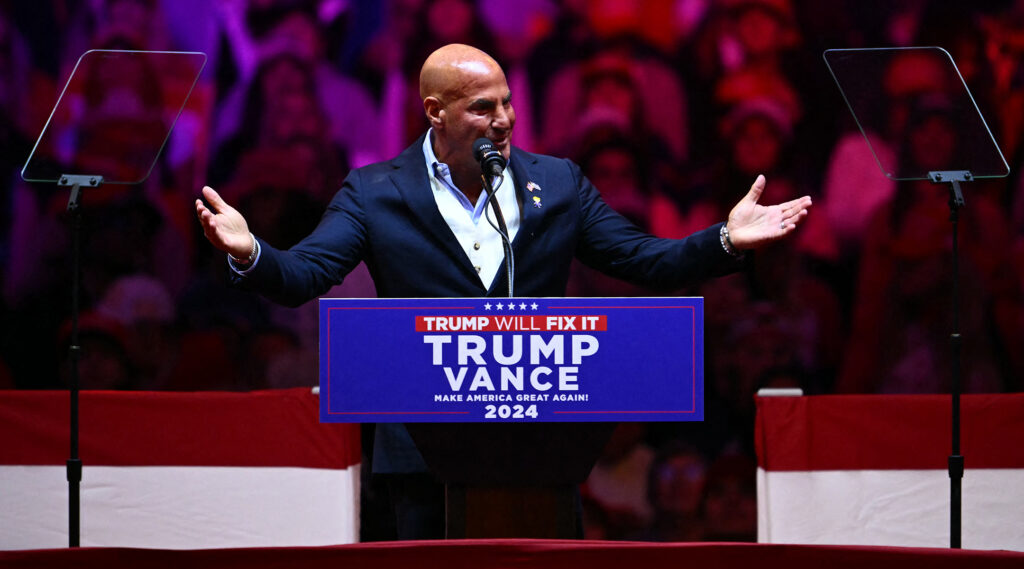
Sid Rosenberg speaks at a campaign rally for Donald Trump at Madison Square Garden, New York, Oct. 27, 2024. (Angela Weiss/AFP via Getty Images)
Sid Rosenberg, a New York shock jock, said he voted for Hillary Clinton in 2016 but soon became a Trump convert, after initially dismissing his seriousness as a candidate. On his show, he has backed Trump and his policies, including seeking to eject migrants from the United States.
Rosenberg become a pro-Israel advocate after Hamas’ Oct. 7, 2023, attack on Israel. He vaulted into national prominence last month when he appeared at Trump’s Madison Square Garden rally, where he mocked comparisons between the rally and one held by American Nazis there in 1939.
This week, he joked with Tulsi Gabbard on his show about becoming White House press secretary under Trump. (Gabbard said his daily briefings would require an R rating.) Gabbard — a former Hawaii congresswoman and presidential candidate who has opposed U.S. support for Ukraine and has promoted conspiracy theories — was picked to become Trump’s national intelligence director the next day. Rosenberg’s joking proposal, meanwhile, did not come to fruition: Trump named Karoline Leavitt as his press secretary on Friday.
Will Scharf
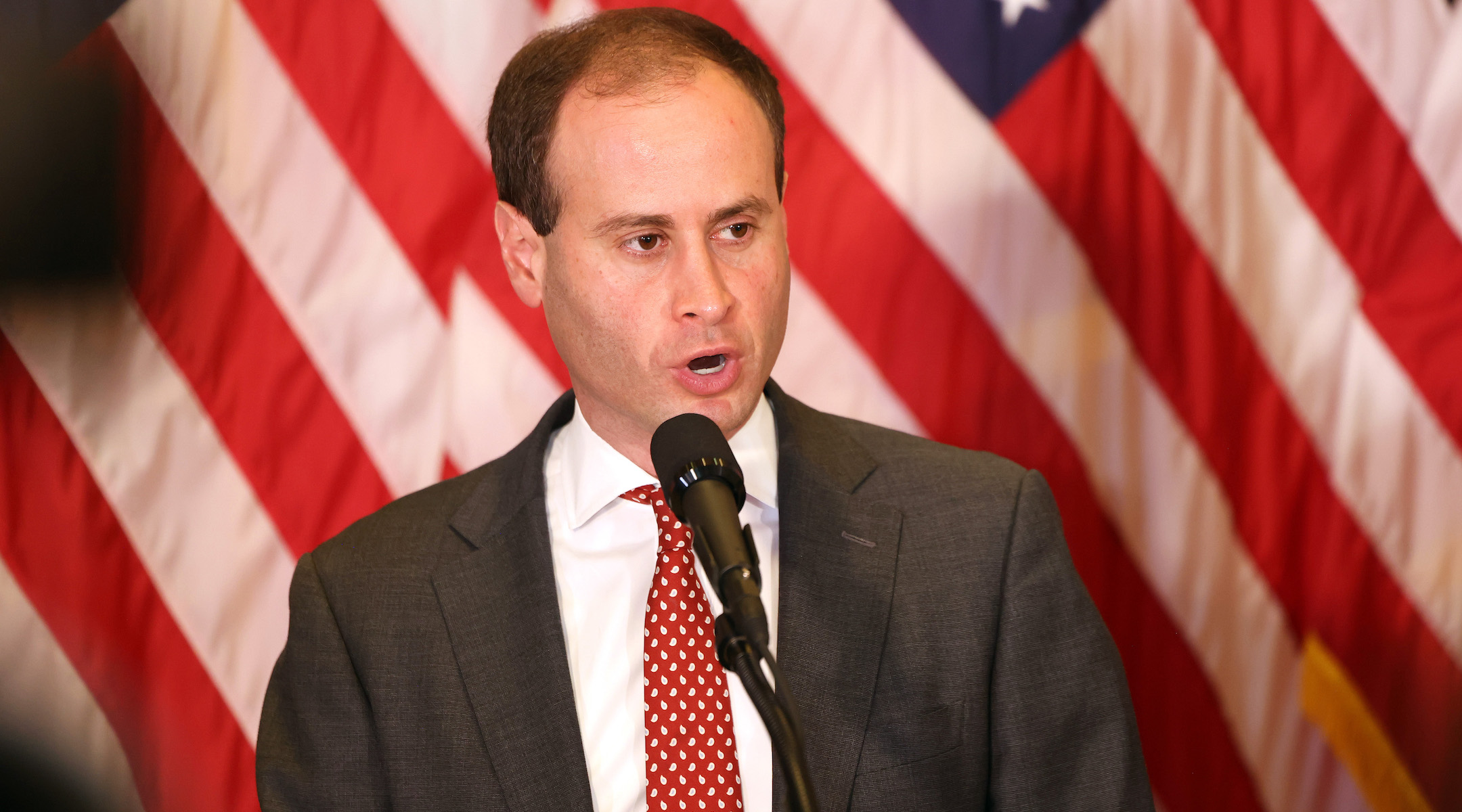
Will Scharf, who has worked as an attorney for Donald Trump, speaks during a press conference at Trump Tower on Sept. 6, 2024 in New York City. (Michael M. Santiago/Getty Images)
Will Scharf, who has worked as an attorney for Trump and defended him on TV, has been chosen as White House staff secretary, a key role managing which information the president sees.
Scharf, 38, was raised modern Orthodox in New York City and Florida, according to a 2023 profile in Jewish Insider, and attended Phillips Academy in Andover, an elite non-Jewish private prep school in Massachusetts. He told Jewish Insider that he lays tefillin every day and attends Shabbat services at Chabad.
He ran unsuccessfully for the Republican nomination for Missouri attorney general this year after serving as a federal prosecutor. He has also worked as a lawyer in Trump’s criminal proceedings this year and — during the first Trump administration — worked on the efforts to confirm Supreme Court Justices Amy Coney Barrett and Brett Kavanaugh.
In 2023, after announcing his attorney general campaign, Scharf co-founded Jews Against Soros, a group dedicated to combating the Jewish liberal megadonor and what it called his “nefarious” and “radical” agenda. Soros, who is Hungarian-American and survived the Holocaust as a child, is one of the prime targets of antisemitism on the right, but Scharf and his co-founder, hardline right-wing commentator Josh Hammer, said one of the group’s goals was to dispel the idea that criticizing Soros is antisemitic. The group’s website now appears to be inactive.
Trump called Scharf a “highly skilled attorney who will be a crucial part of my White House team.” In his role, he will control the flow of memos and documents to Trump’s desk.
Marc Rowan

Marc Rowan appears at the Hong Kong Global Financial Leaders Investment Summit on November 7, 2023 in Hong Kong. (Vernon Yuen/NurPhoto via Getty Images)
Rowan, a billionaire Wall Street investor, has become one of the most prominent voices in a revolt of Ivy League donors pushing their alma maters to take campus antisemitism more seriously.
Now, Rowan is reportedly on President-elect Donald Trump’s shortlist for treasury secretary, a position that would allow him to bring his financial experience and pro-Israel leanings to the White House.
Trump is expected to invite Rowan – whose Apollo Global Management manages around $733 billion in assets – to Mar-a-Lago this week for an interview, according to The New York Times.
Rowan, 62, grew up in a Jewish family on Long Island, the grandson of a New York University economics professor named Emanuel Stein who was known for quoting the Talmud, the Wall Street Journal reported.
He co-founded Apollo in 1990, and has become a fixture on Wall Street as well as in philanthropic circles, serving as board chair of New York’s UJA-Federation. He is personally worth more than $6 billion, according to Forbes.
He drew broader attention after Hamas’ Oct. 7 attack, when he lambasted the way his alma mater, the University of Pennsylvania, was responding to Hamas’ attack.
“Microaggressions are condemned with extreme moral outrage and yet violence, particularly violence against Jews, antisemitism, seems to have found a place of tolerance on the campus,” Rowan told CNBC days after the Hamas attack, adding that donors should cut contributions to Penn — an early example of a prominent Jewish business figure using their sway to combat campus anti-Israel activism after Oct. 7.
JTA has documented Jewish history in real-time for over a century. Keep our journalism strong by joining us in supporting independent, award-winning reporting.
